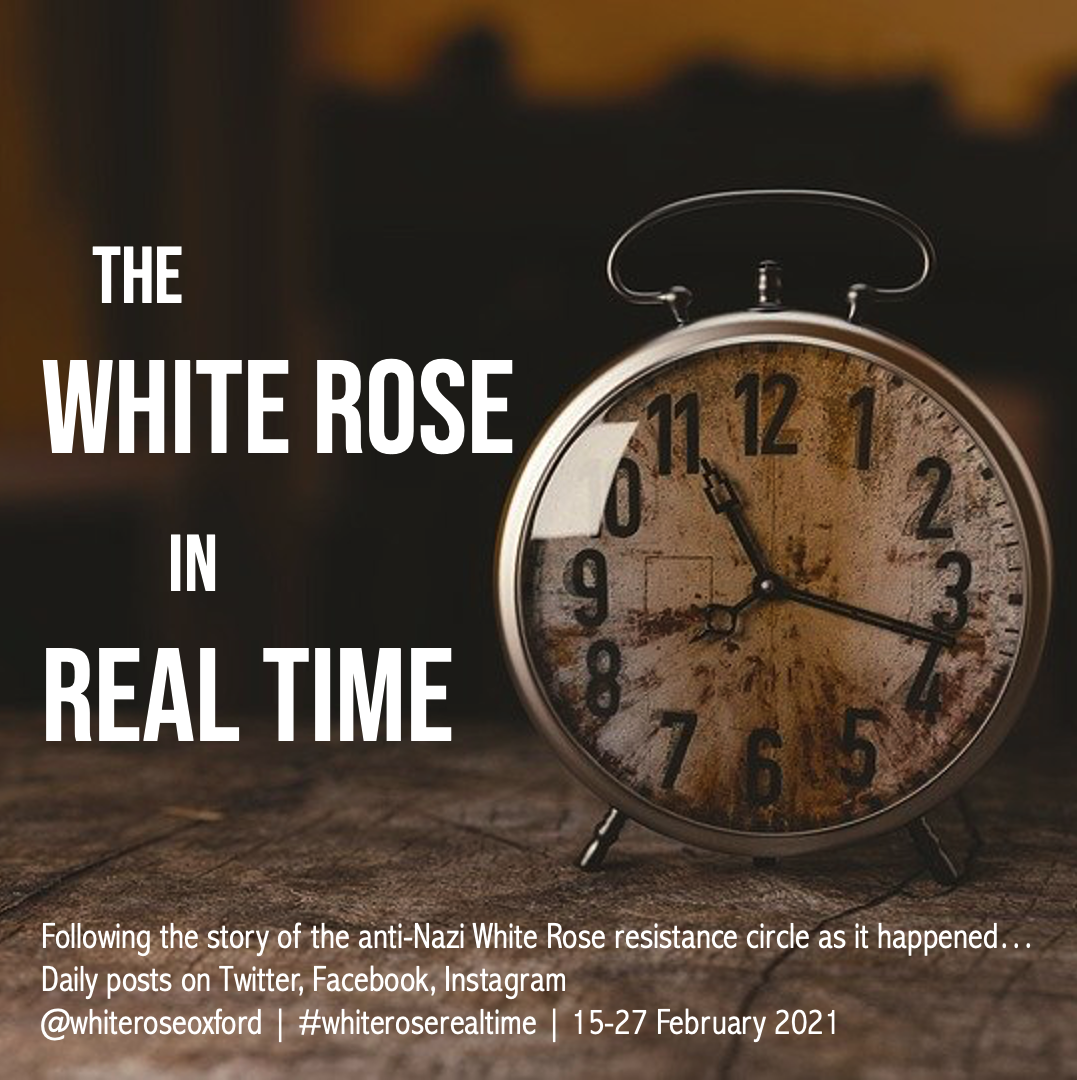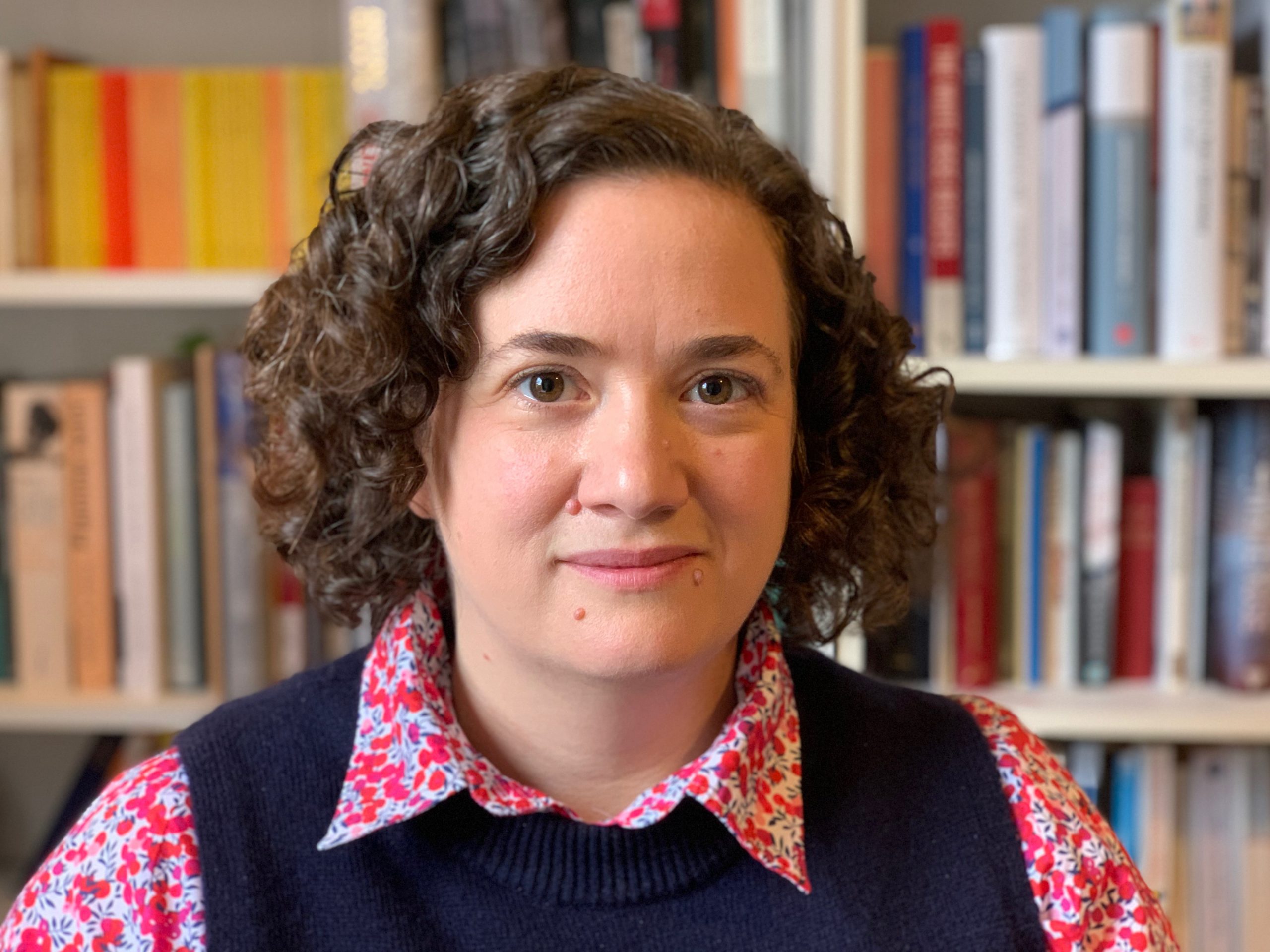On Wednesday 22 June 2022, members of the White Rose Project were invited to speak at the Chalke Valley History Festival – the UK’s biggest festival devoted to history!
Dr Alex Lloyd chose to begin the story not in Munich, but in nearby Salisbury where her grandmother – born in the same year as White Rose member Sophie Scholl – had been stationed during World War II. Alex was joined onstage by two student members of the project: Amy Wilkinson, who was part of the first generation of White Rose student translators and who worked on the pamphlets, and Rachel Herring, who was part of the project in 2020-2021 and 2021-2022. Read Rachel and Amy’s reflections on the White Rose Project below.

Amy Wilkinson commented on the experience of translating the White Rose resistance pamphlets:
My first encounter with the White Rose group came not through the written word, but in fact through film. Namely, Marc Rothemund’s Sophie Scholl – Die letzten Tage, which many of you interested in the subject may be familiar with. I still remember many of its scenes vividly, but particularly its final one, as the screen goes black, the students are led to the guillotine, and Hans Scholl exclaims his final words: “Es lebe die Freiheit” – “Long live freedom”.
Freedom. Although the White Rose pamphlets were sometimes written in a highly intellectual style, it was simple concepts such as such as “freedom” and “honour” which appeared time and time again. The White Rose translation project had a profound effect on me in many ways, not least because it highlighted the extraordinary irony that we as university students could freely collaborate in our work, when, almost 80 years earlier, this was certainly not the case for the White Rose group.
I joined the White Rose project in its first year, when Alex had the idea to bring students together in an attempt to translate the six pamphlets collaboratively. As well as mirroring the way the pamphlets were originally written, translating in a team meant that there were always several solutions to pick from, resulting in the best translation possible. The project certainly did not disappoint; each translation meeting was incredibly interesting and often involved discussions of history and culture as well as language itself.
But that is not to say that translating the pamphlets was without its challenges. Often, we sought to find a balance between producing good English versions of the texts, whilst not being tempted to alter the meaning of the original language, especially given we had the benefit of hindsight. Perhaps unsurprisingly for German texts, we soon discovered that the pamphlets were full of incredibly ‘German’ terms such as Geist, Reich, Staat and Volk, which resisted translation. As language students we broadly understood the implications of these terms, but trying to find a comprehensive and consistent way of translating them proved difficult. The epitome of this particular problem presented itself in the term “Flugblatt”, a word we have chosen to translate as ‘pamphlet’. The publishing of “Flugblätter” is an established tradition in German history, but the term actually lacks a direct English-language equivalent. Although we considered other terms such as leaflet, we ultimately decided on “pamphlet” because of its political connotations.
Something else which I had not anticipated was just how much intertextuality we would need to decipher in the pamphlets. Philosophical and theological works ranging from the Bible to Novalis are quoted throughout the pamphlets, and so were to be translated along with any original text. Indeed, I often found that an awareness of religious jargon was an incredibly useful thing to have.
But as the situation of the war became more desperate, the style and language of the pamphlets fundamentally changed. Originally advocating passive resistance and drawing on authors who influenced them, the pamphlets became much shorter and more explicit in their call to action. As part of a later phase of this project, I helped translate a seventh pamphlet, a draft which the White Rose never published. The closing lines of this final text speak to this transformation. It reads, “the choice is yours…and when you have chosen, act”. Although much of our work has been concerned with the White Rose’s written contributions, this group of individuals possessed a unique courage in turning printed language into real action and tangible sacrifice.
I’d just like to finish with an excerpt from the fourth pamphlet, a pamphlet which I was initially responsible for during the project. In a concluding paragraph, the text reads: “Although we know that National Socialism’s hold on power can only be broken through military force, we are attempting to reawaken the gravely wounded German spirit from within.” If only the members of the White Rose knew just how far they would succeed in this mission. Indeed, their legacy is now tightly bound up in this German spirit, which lives on in so many ways, including through the work of the White Rose Project.
Rachel Herring spoke about her experience translating the letters of White Rose member Alexander Schmorell:
‘My dear father and mother! It seems it was not to be any other way, and in accordance with the will of God, I am to leave my earthly life today, to enter another, one which will never end and where we will all meet again.’ These are the words of Alexander Schmorell, one of the key members of the White Rose, writing to his parents on the day of his execution on the thirteenth of July 1943. Or rather, they are a version of his words, translated collaboratively from German into English by student translators of the White Rose project.
Translating the personal writings – that is, diary entries and private letters – of the White Rose members poses both historical and linguistic challenges, and I’d like to give you a brief insight into my experience of translating Alexander Schmorell’s letters, to demonstrate why personal documents like these are so crucial to our understanding of the White Rose.
Many of the conversations we had in our translation group as we began working on the letters revolved around linguistic decisions. Should we translate the letters into the kind of English that would have been used in 1943, or make them sound more contemporary? Would ‘modernising’ the language of the letters make Alexander Schmorell’s voice feel more relevant and accessible to modern-day readers and listeners, or would this make it lose authenticity? One of the challenges of the White Rose is that they are simultaneously ordinary and extraordinary. In many of their writings we see their youthfulness and their deepest and most personal reflections, some of which were strikingly recognisable to us as modern-day students. On the other hand, it was imperative not to lost sight of the exceptional circumstances in which they lived and their exceptional actions in attempting to resist National Socialism. Our ambition in translating the personal writings of the White Rose was to balance the extraordinary history of their political actions with their identities as ordinary young people.
One of my favourite passages is from one of Alexander Schmorell’s letters in 1937, to the Russian woman who was his nanny, whom he refers to as Nyanya. He writes: ‘Dear Nyanya! Did you get my letter? I was delighted to get your cake. It arrived just this Sunday, so I got to have a very tasty cake for tea. It goes without saying that I’d be very happy for you to send me more of your baking. You can send as much, and as often, as you like.’ Passages like this are why the letters and diaries of the White Rose are so valuable. They add the human face to these individuals who are so often oversimplified, idolised, anonymised and assigned to the sweeping category of a ‘resistance group.’ While it was a challenge to capture the personalities of the White Rose in translation, not to mention deeply challenging and moving to translate the letters they wrote in the hours before their executions, I hope that the translations we produced can be read alongside the pamphlets to provide a fuller picture of these individuals who were not only members of a resistance group, but were above all young people with histories, passions and aspirations.
In this spirit, I’d like to finish with another extract from Alexander Schmorell’s letter to his parents just hours before his execution, and this time I’d like to read it in his own words too. ‘…ich gehe hinüber in dem Bewusstsein, meiner tiefen Überzeugung und der Wahrheit gedient zu haben. Dies alles lässt mich mit ruhigem Gewissen der nahen Todesstunde entgegensehen.’ ‘…I pass on in the knowledge that I have remained faithful to my deepest convictions, and the truth. All of this allows me to face the imminent hour of my death with a clear conscience.’
You can read more in Defying Hitler – The White Rose Pamphlets (Bodleian Library Publishing, 2022).



